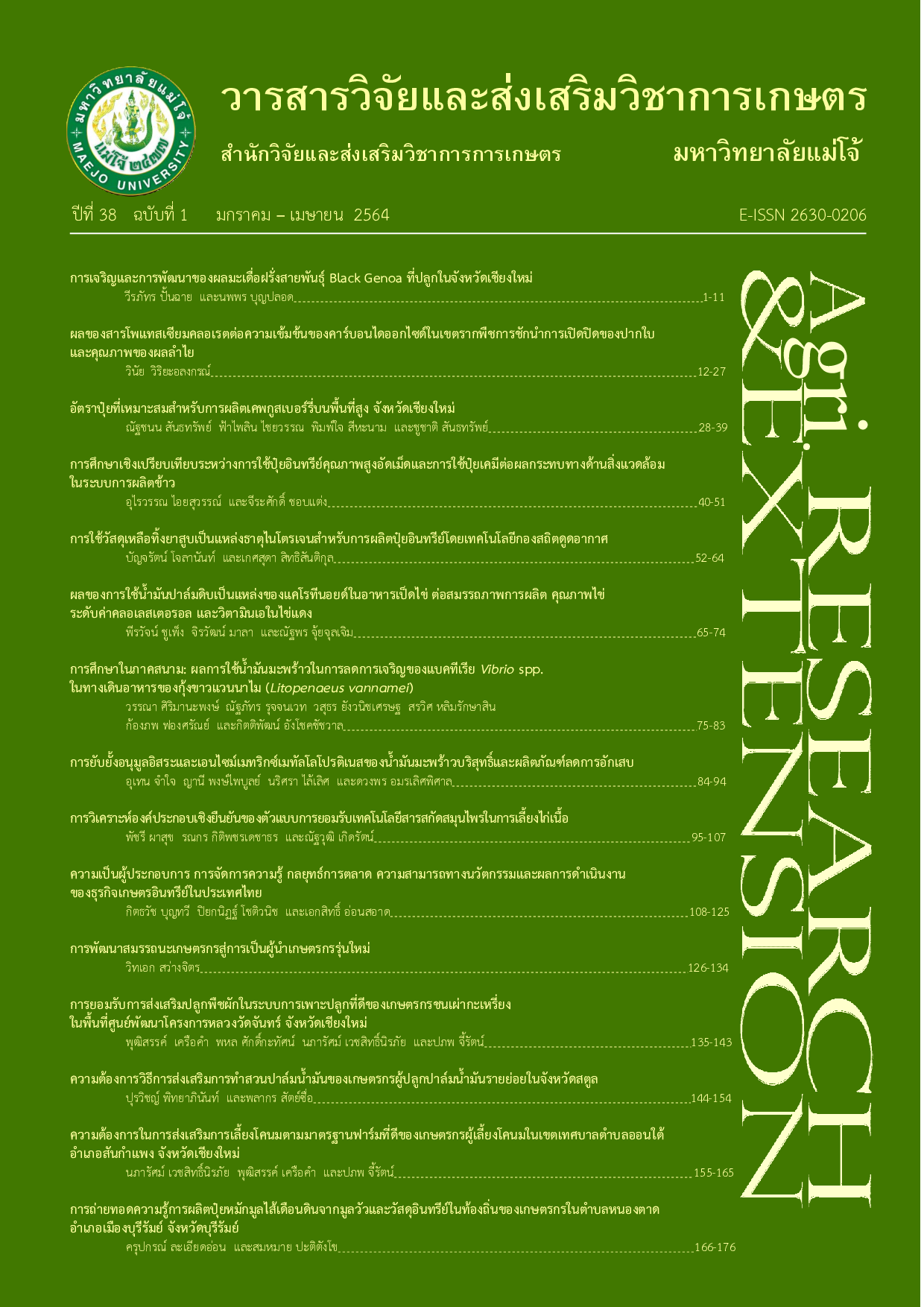การศึกษาในภาคสนาม: ผลการใช้น้ำมันมะพร้าวในการลดการเจริญของแบคทีเรีย Vibrio spp. ในทางเดินอาหารของกุ้งขาวแวนนาไม (Litopenaeus vannamei)
คำสำคัญ:
กุ้งขาวแวนนาไม, น้ำมันมะพร้าวบริสุทธิ์, อาหาร, แบคทีเรียวิบริโอบทคัดย่อ
งานวิจัยนี้มีวัตถุประสงค์เพื่อประเมินประสิทธิภาพของน้ำมันมะพร้าวบริสุทธิ์ในการยับยั้งการเจริญของแบคทีเรียในสกุล Vibrio spp. ในทางเดินอาหารของกุ้งขาวแวนนาไม (Litopenaeus vannamei) จึงได้นำกุ้งขาวแวนนาไมมาเลี้ยงด้วยอาหารที่ต่างกันสามชนิด คือ อาหารกุ้งสำเร็จรูปทั่วไป อาหารกุ้งสำเร็จรูปผสมน้ำมันมะพร้าวบริสุทธิ์ 3% และอาหารกุ้งสำเร็จรูปผสมน้ำมันมะพร้าวบริสุทธิ์ 6% และสุ่มเก็บตัวอย่างทางเดินอาหารที่ 48 และ 96 ชั่วโมง ผลการทดลองพบว่าจำนวนเชื้อวิบริโอ ในทางเดินอาหารของกุ้งมีจำนวนลดลงในกลุ่มที่ได้รับน้ำมันมะพร้าวบริสุทธิ์ และลดลงอย่างมีนัยสำคัญสำหรับสปีชีส์ V. alginolyticus (p<0.05) แต่ไม่มีความแตกต่างกันระหว่างกลุ่มที่ได้รับน้ำมันมะพร้าวบริสุทธิ์ 3% และ 6% และไม่มีผลต่อคุณภาพในระหว่างการทดลอง การวิจัยครั้งนี้ชี้ให้เห็นว่า น้ำมันมะพร้าวบริสุทธิ์ จึงมีประสิทธิภาพในการยับยั้งการเจริญเติบโตของแบคทีเรียในสกุล Vibrio spp. ในทางเดินอาหารของกุ้งขาวแวนนาไม และน่าจะเป็นอีกทางเลือกหนึ่งในการใช้ควบคุมประชากรแบคทีเรียก่อโรคโดยไม่ใช้สารเคมีและยาปฏิชีวนะ
เอกสารอ้างอิง
Albuquerque, C., S. Cristina and H.S. Regine. 2013. Microbiota of Vibrio sp. in the hepatopancreas of cultured white pacific shrimp (Litopenaeus vannamei). Revista MVZ Córdoba 18(2): 3439-3443.
Bawalan, D.D. and K.R. Chapman. 2006. Virgin Coconut oil Production Manual for Micro- and Village-scale Processing Bangkok: Thammada Press. 15 p.
Boyd, C.E., A.A. McNevin and C. Engle. 2017. Resource use assessment of shrimp, Litopenaeus vannamei and Penaeus monodon, production in Thailand and Vietnam. Journal of the World Aquaculture Society 48(2): 201-226.
Di Pinto, A., V. Terio and G. Tantillo. 2011. Comparison between thiosulphate-citrate-bile salt sucrose (TCBS) agar and CHROM agar vibrio for isolating Vibrio parahaemolyticus. Food Control 22(1): 124-127.
Gonzalez-Felix, M.L., A.L. Lawrence, D.M. Gatlin III, and M. Perez-Velazquez. 2002. Growth, servival and fatty acid composition of juvenile Litopenaeus vannamei fed different oils in the presence and absence of phospholipids. Aquaculture 205(3-4): 325-343.
Govaris, A., N. Solomakos and P. Chatzopoulou. 2010. The antimicrobial effect of oregano essential oil, nisin and their combination against Salmonella enteritidis in minced sheep meat during refrigerated storage. International Journal of Food Microbiology 137(2-3): 175-180.
Gracia-Valenzuela, M., M. Vergara-Jimenez and F. Cabrera-Chavez, 2014. Antimicrobial effect of dietary oregano essential oil against Vibrio bacteria in shrimps. Archives of Biological Sciences 66(4): 1367-1370.
Harahap, U. and J. Silalahi. 2014. Antibacterial activity of enzymatic hydrolysis of virgin coconut oil against Salmonella. International Journal of Pharm Tech Research 6(2): 589-599.
Hayatullina, Z., N. Muhammad, N. Mohamed and I.N. Soelaiman. 2012. Virgin coconut oil supplementation prevents bone loss in osteoporosis rat model. Evidence-Based Complementary and Alternative Medicine 2012(237236): 1-8.
Joshi, J., J. Srisala and S. Thitamadee. 2014. Variation in Vibrio parahaemolyticus isolates from a single Thai shrimp farm experiencing an outbreak of acute hepatopancreatic necrosis disease (AHPND). Aquaculture 428-429(2014): 297-302.
Kumara, K.R.P.S. and M. Hettiarachchi. 2017. White faeces syndrome caused by Vibrio alginolyticus and Vibrio fluvialis in shrimp, Penaeus monodon (Fabricius 1798)-multimodal strategy to control the syndrome in Sri Lankan grow-out ponds. Asian Fisheries Science 30(4): 245-261.
Leaño, E.M., C.R. Lavilla-Pitogo and M.G. Paner. 1998. Bacterial flora in the hepatopancreas of pond-reared Penaeus monodon juveniles with luminous vibriosis. Aquaculture 164(1-4): 367-374.
Manju, S., B. Malaikozhundan, B. Withyachumnarnkul and B. Vaseeharan. 2016. Essential oils of Nigella sativa protects Artemia from the pathogenic effect of Vibrio parahaemolyticus Dahv2. Journal of Invertebrate Pathology 136: 43-49.
Nagase, S., M. Matsue, Y. Mori, M. Honda-Ogawa, K. Sugitani, T. Sumitomo, M. Nakata, S. Kawabata and S. Okamoto. 2017. Comparison of the antimicrobial spectrum and mechanisms of organic virgin coconut oil and lauric acid against bacteria. Journal of Wellness Health Care 41(1): 87-95.
Nevin, K.G. and R. Rajamohan. 2006. Virgin coconut oit supplemented diet increases the antioxidant status in rats. Food Chemistry 99(2): 260-266.
Ogbolu, D.O., A.A. Oni, O.A. Daini and A.P. Oloko. 2007. In Vitro antimicrobial properties of coconut oil on Candida species in Ibadan, Nigeria. Journal of Medicinal Food 10(2): 384-387.
Shilling, M., L. Matt and C.J. Woolverton, 2013. Antimicrobial effects of virgin coconut oil and its medium-chain fatty acids on Clostridium difficile. Journal of Medicinal Food 16(12): 1079-1085.
Tangwatcharin, P. and P. Khopaibool. 2012. Activity of virgin coconut oil, lauric acid or monolaurin in combination with lactic acid against Staphylococcus aureus. Southeast Asian Journal of Tropical Medicine & Public Health 43(4): 969-985.
Tzuc, J.T., D.R. Escalante and M.L.A Ortiz. 2014. Microbiota from Litopenaeus vannamei: digestive tract microbial community of Pacific white shrimp (Litopenaeus vannamei). SpringerPlus 3(1): 280.
Wu., P., W. Yang, Y. Dong, Y. Wang, Y. Zhang, X. Zou, H. Dongue, Y. Cui and Z. Chen. 2019. Feasibility of cultivation of Spinibarbus sinensis with coconut oil and its effect on disease resistance (nonspecific immunity, antioxidation and mTOR and NF-kB signaling pathways). Fish & Shellfish Immunology 93: 726-731.
ดาวน์โหลด
เผยแพร่แล้ว
รูปแบบการอ้างอิง
ฉบับ
ประเภทบทความ
สัญญาอนุญาต
บทความนี้ได้รับการเผยแพร่ภายใต้สัญญาอนุญาต Creative Commons Attribution-NonCommercial-NoDerivatives 4.0 International (CC BY-NC-ND 4.0) ซึ่งอนุญาตให้ผู้อื่นสามารถแชร์บทความได้โดยให้เครดิตผู้เขียนและห้ามนำไปใช้เพื่อการค้าหรือดัดแปลง หากต้องการใช้งานซ้ำในลักษณะอื่น ๆ หรือการเผยแพร่ซ้ำ จำเป็นต้องได้รับอนุญาตจากวารสาร





